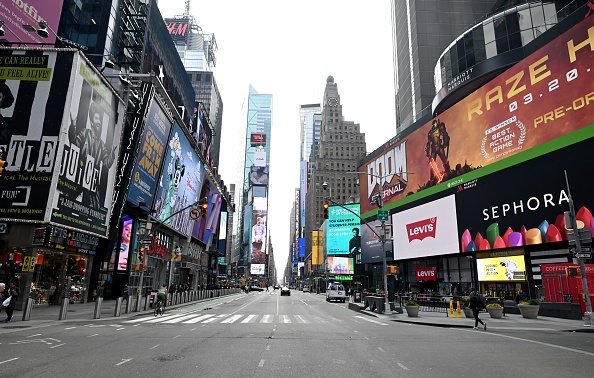CO Conference: How Retailers Are Responding to the Coronavirus Shutdown
By Chava Gourarie March 17, 2020 6:43 pm
reprints
It’s a nightmare scenario for restaurateurs and retailers around the country, as mandated shutdowns and coronavirus fears have brought business to a standstill.
While consumers have disappeared, retailers’ financial obligations have not. Rent is still due, payroll still needs to be met, and suppliers need to be paid for inventory that may not make it to the shelves.
What’s a business owner, a landlord, or a lender to do?
Commercial Observer convened a panel of experts on retail brokerage, financing and sales to discuss what businesses can do, what they can expect from financial markets and government intervention, and what we’ve learned from previous crises.

The main takeaway from the virtual panel, moderated by CO editor-in-chief Max Gross, was to take heart. While this is an unprecedented crisis in modern times, it is one of many the United States, and New York City in particular, has weathered in the last two decades.
The first message from the execs was that the industry will get through this, though there will be casualties, and the second was that while much remains unknown, the federal government will backstop some of the hemorrhaging.
“People will go out again,” said panelist Gregory Tannor, a principal at Lee & Associates. “When we’re permitted to have social gatherings again, people are going to want to go out again.” But many restaurants and fitness studios, which make up a vast number of retail tenants in New York City, may not make it until then.
“It’s mom-and-pop restaurants that might never open again,” Tannor continued. “They have rent to pay every month. Landlords are going to have to make some sacrifices to keep their tenants in their spaces.”
It’s not just urban storefront businesses that are feeling the pain. Mall retailers that are already struggling and operating on thin margins may not be able to withstand an extended shutdown, said Thomas Dobrowski, a vice chairman at Newmark Knight Frank who specializes in mall transactions. “There are dozens of retailers that have been suffering, that are shaky, and that are going to need some type of relief or assistance, whether it’s from landlords or government,” he said. “If they’re forced to close, you’ll start to see a domino effect.”
One outcome could be more strategic partnerships between landlords and retailers, such as the recent deal between Simon Property Group and Forever 21, in which the mall owner purchased the bankrupt retail chain, Dobrowski said.
Dustin Stolly, a vice president of capital markets at Newmark, said it was too early to say how the mom-and-pops would fare, given that the federal government is likely to step in. “We don’t know what the federal government is going to do for small businesses,” Stolly said.
Kevin Draper, a New York City historian who consults with businesses across the city, agreed that we’re in a holding pattern. Hotels and event spaces are booked through the summer and fall, Draper said, and spring events are being rescheduled rather than cancelled. “Everything’s on hold, but when the news gets better, [the pent up demand] is waiting to burst out again,” he said.
However, while consumption will likely resume once the shutdown is lifted, it could change consumer habits, Dobrowski said. People might focus more on value, rather than discretionary spending or splurging on luxury items. “If there’s a shift to more value-based products, that might be a longer-lasting change,” he said.
While shops, fitness studios and restaurant owners are figuring out how to manage in the upcoming weeks, there is also uncertainty about the broader impacts on the economy and on financial markets.
Toby Cobb, the co-founder and managing partner of 3560 REIT, said it’s important to recognize that we are in a totally different situation than in the financial crisis of 2008. “I, myself, believe that commercial real estate will serve as a haven asset, as we likely go into some form of recession,” he said.
Unlike in 2008, the fundamentals in commercial real estate are much stronger across the board, making it one of the more attractive sectors in this era of uncertainty, Cobb said. Underwriting is much more conservative, loan-to-value ratios are sub-60 percent, and debt yields are above ten percent. “Those are wildly different parameters, and some of the basis of my optimism about the real estate asset class,” he said.
Despite Cobb’s optimism, he cautioned that tenants will suffer in the short term, and lenders will have to work with borrowers to see them through the crisis.
While real estate might prove to be a safe haven, the wild swings in the stock market over the past week have given rise to justified concern. And when the federal government moved to lower interest rates on Sunday in an effort to halt the market’s slide, it appeared to have backfired. Markets suffered their worst single-day slide since 1987 on Monday, with the Dow Jones Industrial Average and the S&P 500 falling 12 and 12.9 percent, respectively.
Cobb said the reaction was likely because the Fed’s move was expected and didn’t quite show how far the government is willing to go. “We need a nuclear cannon coming out of the administration to put a hold on this,” he said.
“There’s still a lot of tools in that toolbelt,” Stolly agreed.
As of Tuesday afternoon, the Trump administration was outlining an $850 billion stimulus plan, which could aid the embattled airline and cruise ship industries, and it was considering cutting checks to Americans.



